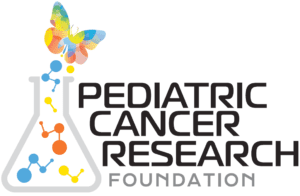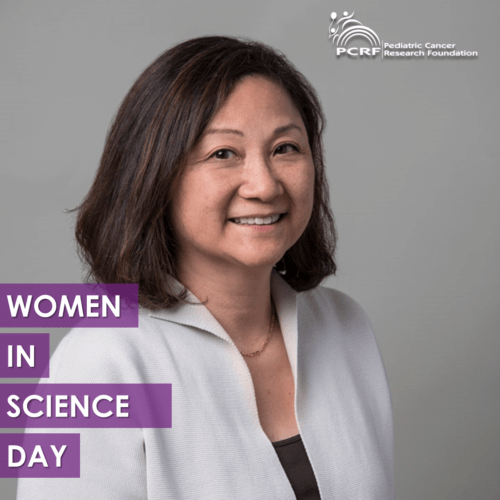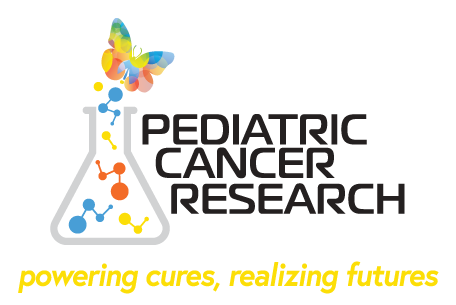In honor of Women in Science Day, the Pediatric Cancer Research Foundation proudly recognizes some of the brilliant women funded by PCRF. They are leading the way in their fields and working to cure pediatric cancer.
Learn more about these heroic women who are making a difference and changing the futures for kids fighting pediatric cancer.
Dr. Kathleen Sakamoto – Lucile Packard Children’s Hospital Stanford
Dr. Sakamoto’s goal at Lucile Packard Children’s Hospital Stanford is to bring new drugs to children with relapsed acute leukemia. She is making progress not only in understanding how these new drugs work but also studying how to best use these drugs in patients. Her hope is to improve the overall survival of children with relapsed leukemia so that they will live healthy and productive lives.

Dr. Amanda Saratsis – Ann & Robert H. Lurie Children’s Hospital
Dr. Saratsis hopes to bring new therapies to clinical trials and improve outcomes for patients with pediatric brain tumors. Initial research will focus on pediatric high-grade glioma (pHGG) and diffuse intrinsic pontine glioma (DIPG). Children affected by these tumors are in dire need of improved treatment options and outcomes.
It has already gained global attention due to the initial findings from the project and the work will be accelerated through generous philanthropic support from the Pediatric Cancer Research Foundation.

Dr. Eugenie Kleinerman – MD Anderson Cancer Center
Dr. Kleinerman’s research focuses on the development of novel therapies for children with sarcomas, particularly osteosarcoma lung metastases. Osteosarcoma (OS) is the most common primary malignant bone tumor in children, adolescents, and young adults. Altering chemotherapy, including dose intensification, has not improved the 65% survival rate for children, adolescents, and young adults (AYAs) with osteosarcoma. The survival for patients with metastases and those that relapse after chemotherapy is less than 20%. Identifying new therapies is imperative. Funding provided by the Pediatric Cancer Research Foundation will support Drs. Kleinerman and Watowich investigate whether a unique molecularly engineered DC vaccine that augments T-cells is effective against primary and metastatic OS using preclinical mouse models and whether its activity can be augmented when combined with checkpoint inhibitors.

Dr. Jana Ellegast – Dana-Farber Cancer Institute
Dr. Ellegast’s is focused on new research that has the potential to offer effective targeted therapies for children facing AML. Leukemia is the most common type of childhood cancer and the second most common cause of cancer-related mortality in children. Treatment options are often limited, particularly for children with acute myeloid leukemia (AML). The laboratory at the Dana-Farber Cancer Institute specializes in discovering new lead compounds and protein targets for cancer therapy. This work will be crucial to the development of selective inhibitors and ultimately enable us to bring these new medicines to children with AML.

Dr. Jenna Sopfe — University of Colorado, Denver
Dr. Sopfe’s research supports the high-value PCRF places on the quality of life survivorship. This study will help ensure that the futures of these children are both long and healthy. Over 80% of children diagnosed with childhood cancer now survive their disease. However, many of these children still suffer from the long-term effects of their diagnosis or treatment, which unfortunately results in decreased quality of life. One area of concern is that childhood cancer survivors (CCS) experience sexual dysfunction (SD), which occurs in roughly 30-50% of CCS. This proposal aims to address the unmet need for recognition and treatment of SD in AYA CCS by exploring patient preferences regarding the timing and method of evaluation for SD as well as by evaluating the use of an existing tool that has been previously validated in older adult cancer populations.

Dr. Michelle Monje – Lucile Packard Children’s Hospital Stanford
Dr. Monje’s research focuses on effective therapy for pediatric high-grade gliomas. Her lab has laid the foundation for three new clinical trials that opened for enrollment in 2020 for children with pediatric high-grade glial malignancies. Supporting postdoctoral fellows to train in the Monje Lab would both accelerate research progress and direct the careers of new scientists towards childhood brain tumor research, a result that will pay dividends in the decades to come.

Dr. Ashley Plant-Fox – Ann & Robert H. Lurie Children’s Hospital
Dr. Plant-Fox’s research focuses on a cutting-edge Clinical Trial of DIPG. This trial has the potential to extend survival rates for patients who are diagnosed with DIPG, the deadliest form of child brain cancer. Diffuse intrinsic pontine glioma (DIPG) is a devastating pediatric brain cancer that is typically found in children ages 5-8 years and has rapid onset of symptoms over a period of weeks. There are around 200-300 children per year diagnosed with this disease. Families travel across the country and sometimes the world seeking available clinical trials or new treatments. One possible mechanism to target these known mutations is to use immunotherapy, therapy that uses the body’s own immune system to attack the tumor. Here, we have created a vaccine, rHSC-DIPGVax, with the goal of triggering the immune system to recognize the genetic alterations known to be present in DIPG tumors and, using immune cells known as T cells, attack the tumor. This combination immunotherapy for the treatment of newly diagnosed DIPG and diffuse midline glioma will move forward in a phase I/II clinical trial later this year.

The Pediatric Cancer Research Foundation is proud to fund these Women in Science. These are just some of the amazing researchers focused on putting your generous donations to work in 2021. You can help us fight cancer with research.






